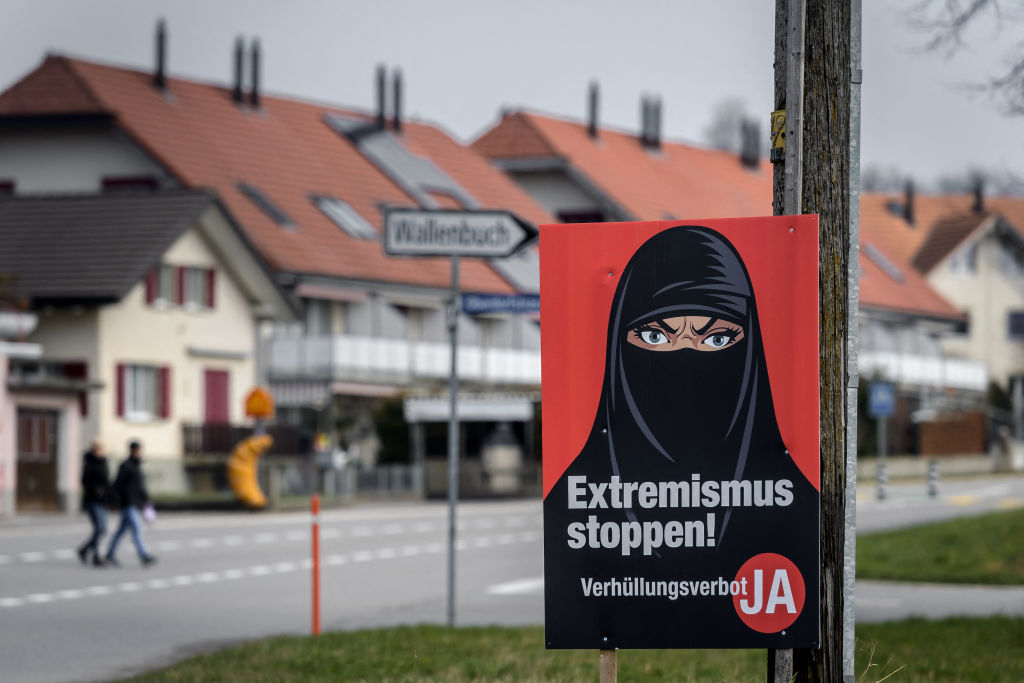Is Switzerland ‘Islamophobic’? Critics of the country’s decision to outlaw face coverings think so. The ‘Burqa ban’, which passed into law last week as a result of a narrow vote in a referendum, applies to any form of face covering in a public gathering, unless worn for health reasons, at religious congregations, or carnivals. The legislation is not, at least directly, aimed at Muslims. And, what’s more, very few Swiss Muslims wear a burqa or niqab: almost no one in Switzerland wears a burqa and only around 30 women wear the niqab, according to research by the University of Lucerne. But the condemnation has nonetheless been swift. It was ‘a dark day’ for Muslims, the Central Council of Muslims in Switzerland has said.
The Swiss vote came two weeks or so after France passed its ‘anti-separatism bill’ into law, seeking to ‘reinforce republican principles’. The law upholds mandatory schooling, cracks down on hate speech and seeks to monitor where places of worship and religious institutions get their cash. It is presented by its supporters as a reaffirmation of the centuries-old laïcité — set out in in a 1905 law to separate the church and the state — in public spheres. Yet for others, France’s move — just like the ban in Switzerland — is seen as ‘Islamophobic’.
Is this right? As with Switzerland’s law, France’s new measures are not aimed directly at any particular group. What’s more, the new legislation also looks strikingly similar to measures already in place in some Muslim-majority states.
At least 10 such countries have partial or complete bans on face veils or headscarves, including Chad, Tunisia, Morocco, Algeria, Uzbekistan, Azerbaijan, Tajikistan, Turkey, Bosnia and Kosovo.
France is also far from alone in implementing tough counter-terror measures. Similar rules have been imposed in Bangladesh, Egypt, Uzbekistan, Indonesia. Pakistan also officially announced reforms for madrassas (Islamic seminaries) as part of its counter-terrorism National Action Plan.
What is clear is that countries across the Muslim world have seen a connection between some mosques and jihadist militancy, and have looked to curtail it. Fears about security also motivated the ban on full-face veils in Chad and Tunisia. Similarly, other majority-Muslim countries have cited secular values as the reason for restricting the wearing of some Islamic clothing.
But when Switzerland and France impose new laws, the condemnation is swift. Imran Khan and Recep Tayyip Erdogan fire up the rhetoric about Europe, conveniently ignoring laws implemented in their own countries.
Paris had to remind Islamabad once again last month that its laws, including the anti-separatism legislation, apply equally to all people of all religions. Such reminders, though, will do little to quell the backlash. For decades, the French tradition of laïcité has restricted the role of Christianity and the Catholic church in the public sphere and governance. Why is this idea only now being seen by some as discriminatory?
Charlie Hebdo has similarly been deemed ‘Islamophobic’ for satirizing Islam. Yet it has been equally, if not more, hostile to Christianity. That the French satirical magazine lost seven of its journalists to a jihadist attack in 2015, or that it found support among some secularist Muslims, has never been reason enough to alter that unequivocal position in the minds of the magazine’s critics. Instead, French laws allowing satire against all religious ideologies (as well as this more recent legislation) continues to be deemed by some to be an attack on one particular religion. It isn’t — and it’s time to stop accusing countries like Switzerland and France of being ‘Islamophobic’.
This article was originally published on The Spectator’s UK website.


















